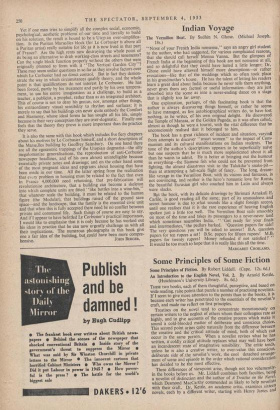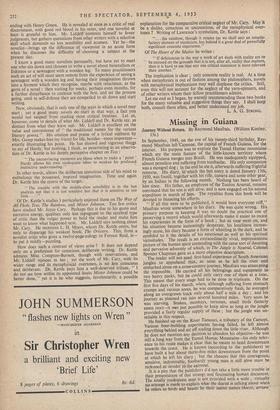Some Principles of Some Fiction
Some Principles of Fiction. By Robert Liddell. (Cape. 12s. 6d.) THESE two books, each of them thoughtful, perceptive, and based on wide reading, raise points that puzzle a number of practising novelists. If I seem to give more attention to the points than to the books, it is because each writer has penetrated to the essentials of the novelist's craft, and made me reflect on first principles.
Treatises on the ,novel tend to concentrate monotonously on certain writers to the neglect of others whom their colleagues rate as highly, and to give accounts of the creative process which make it sound a cold-blooded matter of deliberate and conscious choice. This second point arises quite naturally from the difference between the creative and the critical attitude of mind, both of which can occur in the same person. When a novelist revises what he has written, a coldly critical attitude replaces what may well have been an incandescent state of imaginative sensibility. The critic tends, unless he is also a creative writer, to over-value this conscious, deliberate side of,the novelist's work, the cool detached arrange' ment of scene and episode in the order which rational consideration has decided to be the most effective.
These differences of viewpoint arise, though not too vehemently, in the books before us. Mr. Liddell combines both faculties, being a novelist of distinction and the author of A Treatise on the Novel, which Desmond MacCarthy commended as likely to help novelists with their craft. Dr. Kettle, an academic critic, examines sixteen novels, each by a different writer, starting with Henry James and
ending with Henry Green. He is revealed at once as a critic of real discernment, with good red blood in his veins, and one novelist at least is grateful to him. Mr. Liddell commits himself to fewer judgments, but gathers quotations from other writers with a selective skill which demands no less sensibility and acumen. Yet he—the novelist—brings up the difference of viewpoint in an acute form when he discusses the difficulty of choosing a subject at the present day.
I know a good many novelists personally, but have yet to meet one who sits down and chooses to write a novel about bimetallism or Eskimos or a newsagent with .a wooden leg. To many practitioners such an act of will must seem remote from the experience of seeing a newsagent with a wooden leg and having their imagination thrown into a ferment which they recognise, maybe with reluctance, as the germ of a novel : then waiting for weeks, perhaps even months, for a further disturbance to coalesce with the first, and set the process going, until in self-defence they are compelled to sit down and start writing.
Now, obviously, that is only one of the ways in which a novel may start ; yet a good many novels do start in that way, a fact you would not suspect from reading most critical treatises. Let us, however, come to details of what Mr. Liddell and Dr. Kettle say, as distinct from what they leave out. Mr. Liddell is excellent on the value and convenience of " the traditional names for the various literary genres." His citation and praise of a lyrical outburst by Mrs. Gamp makes him my friend for life, besides—more important— exactly illustrating his point. He has shrewd and vigorous things to say of Hardy, but nothing, I think, as penetrating as an observa- tion of Dr. Kettle in his deeply perceptive chapter on Tess : " The unconvincing moments are those when to make a ' point ' Hardy allows his own inadequate ideas to weaken his profound instinctive understanding."
In other words, allows the deliberate conscious side of his mind to outbalance the possessed, inspired imagination. Time and again Dr. Kettle hits the centre of the target.
" The trouble with the middle-class sensibility is in the last analysis not that it is too sensitive but that it is sensitive to too little . . . ."
Of Dr. Kettle's studies I particularly enjoyed those on The Way of Al! Flesh, Tess, The Rainbow, and Mister Johnson. Too few critics have studied Mr. Joyce Cary. Perhaps this is due to his gusto and narrative energy, qualities only less repugnant to the cerebral type of critic than the vulgar power to hold the reader and make, him want to know what happened next. Mr. Liddell says nothing about Mr. Cary. He mentions L. H. Myers, whom Dr. Kettle omits, but only to disparage his weakest book, The Orissers. This, from a novelist critic who gives a twelve-page eulogy to Forrest Reid, is— to put it mildly—puzzling.
How does such a contrast of views arise ? It does not depend only on a 'preference for conscious, deliberate writing. Dr. Kettle admires Miss Compton-Burnett, though with reservations, and Mr. Liddell rejoices in her ; yet the work of Mr. Cary, with its wider range and its metaphySical overtones, is no less .conscious and deliberate. Dr. Kettle pays him a well-deserved tribute, " I do not see how within its appointed limits Mister Johnson could be better done," yet it is he who suggests, involuntarily, a possible explanation for the comparative critical neglect of Mr. Cary. May it be a dislike, conscious or unconscious, of the metaphysical over- tones ? Writing of Lawrence's symbolism, Dr. Kettle says :
"... the rainbow, though it retains (as we shall see) an unsatis- factory element of mysticism, has behind it a great deal of powerfully significant concrete experience."
Of The Heart of the Matter he writes : " If deficiencies in the way a work of art deals with reality are to be excused on the grounds that it is not, after all, reality that matters, then it is hard to see that any one critical statement is more relevant than another."
The implication is clear ; only concrete reality is real. At a time when metaphysics is out of fashion among the philosophers, novels with metaphysical implications may well displease the critics. Still, even this will not account for the neglect of the yarn-spinners, and of other writers whom their fellow practitioners admire.
Let me end as I began, by warmly recommending these two books for the many valuable and suggestive things they say. I shall keep both, consult them often, and better understand my job.
L. A. G. STRONG.



































 Previous page
Previous page